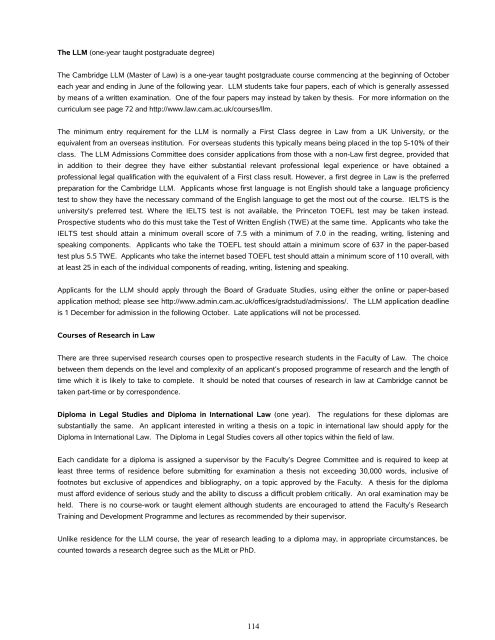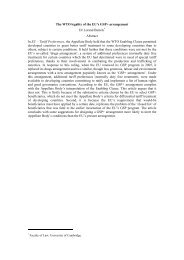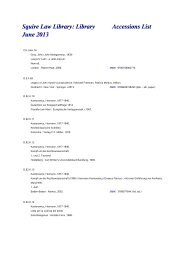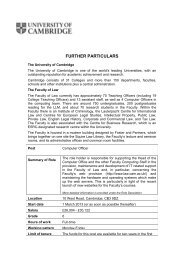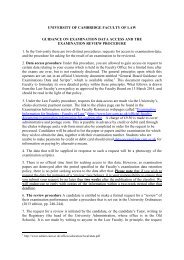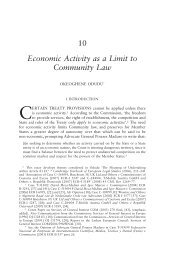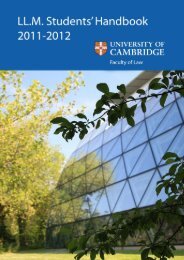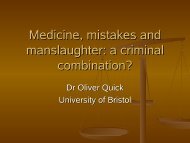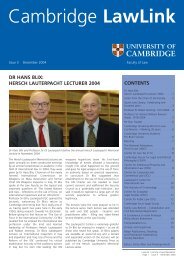The LLM (one-year taught postgraduate degree)The <strong>Cambridge</strong> LLM (Master <strong>of</strong> <strong>Law</strong>) is a one-year taught postgraduate course commencing at the beginning <strong>of</strong> Octobereach year and ending in June <strong>of</strong> the following year. LLM students take four papers, each <strong>of</strong> which is generally assessedby means <strong>of</strong> a written examination. One <strong>of</strong> the four papers may instead by taken by thesis. For more information on thecurriculum see page 72 and http://www.law.cam.ac.uk/courses/llm.The minimum entry requirement for the LLM is normally a First Class degree in <strong>Law</strong> from a UK <strong>University</strong>, or theequivalent from an overseas institution. For overseas students this typically means being placed in the top 5-10% <strong>of</strong> theirclass. The LLM Admissions Committee does consider applications from those with a non-<strong>Law</strong> first degree, provided thatin addition to their degree they have either substantial relevant pr<strong>of</strong>essional legal experience or have obtained apr<strong>of</strong>essional legal qualification with the equivalent <strong>of</strong> a First class result. However, a first degree in <strong>Law</strong> is the preferredpreparation for the <strong>Cambridge</strong> LLM. Applicants whose first language is not English should take a language pr<strong>of</strong>iciencytest to show they have the necessary command <strong>of</strong> the English language to get the most out <strong>of</strong> the course. IELTS is theuniversity's preferred test. Where the IELTS test is not available, the Princeton TOEFL test may be taken instead.Prospective students who do this must take the Test <strong>of</strong> Written English (TWE) at the same time. Applicants who take theIELTS test should attain a minimum overall score <strong>of</strong> 7.5 with a minimum <strong>of</strong> 7.0 in the reading, writing, listening andspeaking components. Applicants who take the TOEFL test should attain a minimum score <strong>of</strong> 637 in the paper-basedtest plus 5.5 TWE. Applicants who take the internet based TOEFL test should attain a minimum score <strong>of</strong> 110 overall, withat least 25 in each <strong>of</strong> the individual components <strong>of</strong> reading, writing, listening and speaking.Applicants for the LLM should apply through the Board <strong>of</strong> Graduate Studies, using either the online or paper-basedapplication method; please see http://www.admin.cam.ac.uk/<strong>of</strong>fices/gradstud/admissions/. The LLM application deadlineis 1 December for admission in the following October. Late applications will not be processed.Courses <strong>of</strong> Research in <strong>Law</strong>There are three supervised research courses open to prospective research students in the <strong>Faculty</strong> <strong>of</strong> <strong>Law</strong>. The choicebetween them depends on the level and complexity <strong>of</strong> an applicant’s proposed programme <strong>of</strong> research and the length <strong>of</strong>time which it is likely to take to complete. It should be noted that courses <strong>of</strong> research in law at <strong>Cambridge</strong> cannot betaken part-time or by correspondence.Diploma in Legal Studies and Diploma in International <strong>Law</strong> (one year). The regulations for these diplomas aresubstantially the same. An applicant interested in writing a thesis on a topic in international law should apply for theDiploma in International <strong>Law</strong>. The Diploma in Legal Studies covers all other topics within the field <strong>of</strong> law.Each candidate for a diploma is assigned a supervisor by the <strong>Faculty</strong>’s Degree Committee and is required to keep atleast three terms <strong>of</strong> residence before submitting for examination a thesis not exceeding 30,000 words, inclusive <strong>of</strong>footnotes but exclusive <strong>of</strong> appendices and bibliography, on a topic approved by the <strong>Faculty</strong>. A thesis for the diplomamust afford evidence <strong>of</strong> serious study and the ability to discuss a difficult problem critically. An oral examination may beheld. There is no course-work or taught element although students are encouraged to attend the <strong>Faculty</strong>’s ResearchTraining and Development Programme and lectures as recommended by their supervisor.Unlike residence for the LLM course, the year <strong>of</strong> research leading to a diploma may, in appropriate circumstances, becounted towards a research degree such as the MLitt or PhD.114
Master <strong>of</strong> Letters (two years). A candidate for the MLitt must have completed six terms <strong>of</strong> research before they can beconsidered for the award <strong>of</strong> the degree. In addition, candidates must have resided in <strong>Cambridge</strong> for a minimum <strong>of</strong> threeout <strong>of</strong> those six terms, unless permission has been granted to live elsewhere (information on ‘Leave to Work Away from<strong>Cambridge</strong>’ can be found at: http://www.admin.cam.ac.uk/<strong>of</strong>fices/gradstud/current/procedures/workaway.html).Candidates are examined on a dissertation <strong>of</strong> not more than 60,000 words, inclusive <strong>of</strong> footnotes but exclusive <strong>of</strong>appendices and bibliography. A dissertation for the MLitt must represent a useful contribution to learning and should takedue account <strong>of</strong> previously published work on the subject. Candidates are also required to attend an oral examination. Aswith the Diploma, the <strong>Faculty</strong>’s Degree Committee is responsible for approving the topic <strong>of</strong> research for each MLittcandidate and assigning a supervisor.Doctor <strong>of</strong> Philosophy (three years). A candidate for the PhD must have completed nine terms <strong>of</strong> research before theycan be considered for the award <strong>of</strong> the degree. In addition, candidates must have resided in <strong>Cambridge</strong> for a minimum<strong>of</strong> three out <strong>of</strong> those nine terms, unless permission has been granted to live elsewhere (information on ‘Leave to WorkAway from <strong>Cambridge</strong>’ can be found at:http://www.admin.cam.ac.uk/<strong>of</strong>fices/gradstud/current/procedures/workaway.html). Candidates are examined on adissertation <strong>of</strong> 80,000 words exclusive <strong>of</strong> footnotes, appendices and bibliography but subject to an overall word limit <strong>of</strong>100,000 words exclusive <strong>of</strong> bibliography. As with the Diploma and MLitt, the <strong>Faculty</strong>’s Degree Committee is responsiblefor approving the topic <strong>of</strong> research for each PhD candidate and assigning a supervisor. A dissertation for the PhD mustrepresent a significant contribution to learning, for example through the discovery <strong>of</strong> new knowledge, the connection <strong>of</strong>previously unrelated facts, the development <strong>of</strong> new theory, or the revision <strong>of</strong> older views, and must take due account <strong>of</strong>previously published work on the subject. Candidates are required to attend an oral examination on the subject <strong>of</strong> theirdissertation and on the general field <strong>of</strong> knowledge within which it falls.MLitt and PhD candidates are, in their first year, registered as candidates for the Certificate <strong>of</strong> Postgraduate Study inLegal Studies, not as candidates for the MLitt or PhD. At the end <strong>of</strong> this probationary first year they may, on therecommendation <strong>of</strong> their supervisor and an independent assessor, and with the approval <strong>of</strong> the <strong>Faculty</strong>’s DegreeCommittee and Board <strong>of</strong> Graduate Studies, be registered as candidates for the appropriate degree.Certificate <strong>of</strong> Postgraduate Study in Legal studies (one year) The purpose <strong>of</strong> the Certificate programme is to providetraining in legal research. Prospective MLitt and PhD candidates are, in the first instance, registered for the Certificateunless they have successfully completed an equivalent research training course elsewhere, in which case exemptionfrom the requirement to complete the Certificate may be given. The Certificate is an integral part <strong>of</strong> the MLitt and PhDand it is not possible for a prospective applicant to apply for it as a separate one-year research course.Candidates for the Certificate are allocated a supervisor by the <strong>Faculty</strong>’s Degree Committee and, towards the end <strong>of</strong> theirfirst year, are required to submit three items for a progress review: a Personal Progress Log which should demonstratean ability to plan appropriate training and research activities to a level necessary to be an independent researcher, a15,000-word dissertation (inclusive <strong>of</strong> footnotes but exclusive <strong>of</strong> bibliography and appendices) which should demonstratedue diligence and an ability to write in an appropriate scholarly manner, and a short explanation <strong>of</strong> the proposed topic <strong>of</strong>PhD or MLitt research. Two assessors are appointed by the <strong>Faculty</strong>’s Degree Committee (normally two members <strong>of</strong> the<strong>Faculty</strong> <strong>of</strong> <strong>Law</strong>) and candidates are required to attend an oral examination. On the basis <strong>of</strong> the Assessors’ report, the<strong>Faculty</strong>’s Degree Committee recommends to the <strong>University</strong> whether or not the candidate should be registered for a PhDor MLitt.Prospective MLitt or PhD candidates who meet the requirements <strong>of</strong> the Certificate and who are permitted to proceed arenormally registered for the degree sought at the end <strong>of</strong> their first year <strong>of</strong> residence and their registration date is normallybackdated so as to include the three terms working on the Certificate.115
- Page 2 and 3:
ContentsGeneral InformationOfficers
- Page 4 and 5:
Settlement of International Dispute
- Page 6 and 7:
Faculty AdministrationFaculty Offic
- Page 8 and 9:
The Faculty of LawLaw has been stud
- Page 10 and 11:
The LLM Degree. This degree is awar
- Page 12 and 13:
Opening Hours:Full Term: Monday to
- Page 14 and 15:
Rules Made by the Information Strat
- Page 16 and 17:
The Lauterpacht Centre for Internat
- Page 18 and 19:
Centre for Corporate and Commercial
- Page 20 and 21:
Cambridge Socio-Legal GroupThe Camb
- Page 26 and 27:
Dates of Faculty Board Meetings7 Oc
- Page 28 and 29:
Proceed with caution in reaching fo
- Page 30 and 31:
Faculty CommunicationEach year, the
- Page 32 and 33:
Law Tripos Part IA. A candidate for
- Page 34 and 35:
Prizes. The following prizes may be
- Page 36 and 37:
PAPER 2. CONSTITUTIONAL LAWA. The a
- Page 38 and 39:
Oliver, Constitutional Reform (2003
- Page 40 and 41:
Hedley, Tort (6th ed 2008)Weir, An
- Page 42 and 43:
3. Trusts and co-ownership: Concurr
- Page 44 and 45:
Brownlie, Principles of Internation
- Page 46 and 47:
Elliott, Constitutional Foundations
- Page 48 and 49:
Contract: covenant and debt; assump
- Page 50 and 51:
Statutes:Blackstone’s Statutes on
- Page 52 and 53:
For reference:Birks and Pretto (ed)
- Page 54 and 55:
Foster, EU Legislation (2010-2011)B
- Page 56 and 57:
PAPER 42. INTELLECTUAL PROPERTY1. I
- Page 58 and 59:
2. Property torts (conversion and t
- Page 60 and 61:
(iii)Causation4. Contracts in Engla
- Page 62 and 63:
Rawls, Political LiberalismRawls, J
- Page 64 and 65: Rodger and McCulloch, The UK Compet
- Page 66 and 67: Law Commission, Renting Homes: The
- Page 68 and 69: Human Rights Case DigestHuman Right
- Page 70 and 71: 3. Title at common law and in equit
- Page 72 and 73: Exemption from Professional Examina
- Page 74 and 75: Paper application available to down
- Page 76 and 77: Form of Examination and Designation
- Page 78 and 79: ‘Open Book’ Papers. Where a pap
- Page 80 and 81: LLM : Syllabuses and Lists of Recom
- Page 82 and 83: ased upon one or two leading cases,
- Page 84 and 85: Goff and Jones, The Law of Restitut
- Page 86 and 87: Butterworths’ Company Law Handboo
- Page 88 and 89: 2. The EU’s system for human righ
- Page 90 and 91: the context of environmental protec
- Page 92 and 93: European Competition Law Review (EC
- Page 94 and 95: Crawford, The Treatment of Combatan
- Page 96 and 97: Douglas, The International Law of I
- Page 98 and 99: Unger, Free Trade Reimagined (2007)
- Page 100 and 101: 3. Sceptics and Critics I4. Sceptic
- Page 102 and 103: The course provides an opportunity
- Page 104 and 105: (iv)(v)(vi)(vii)Is either utilitari
- Page 106 and 107: Reiman, ‘Justice, Civilization, a
- Page 108 and 109: Gardner, Introduction to the Law of
- Page 110 and 111: 1. Types of theoretical analysis an
- Page 112 and 113: 2. Specific fieldsTopics to be sele
- Page 116 and 117: As part of the requirements for the
- Page 118 and 119: Teaching Members of the Faculty of
- Page 120 and 121: MC Elliott, MA, PhD (Cantab); St Ca
- Page 122 and 123: RA Melikan, BA (Mich), JD, MA (Chi)
- Page 124 and 125: BD Sloan, MA, LLM (Cantab); King’
- Page 126 and 127: Law Teachers in the Department of L
- Page 128 and 129: Murray Edwards College. Dr S Turenn


